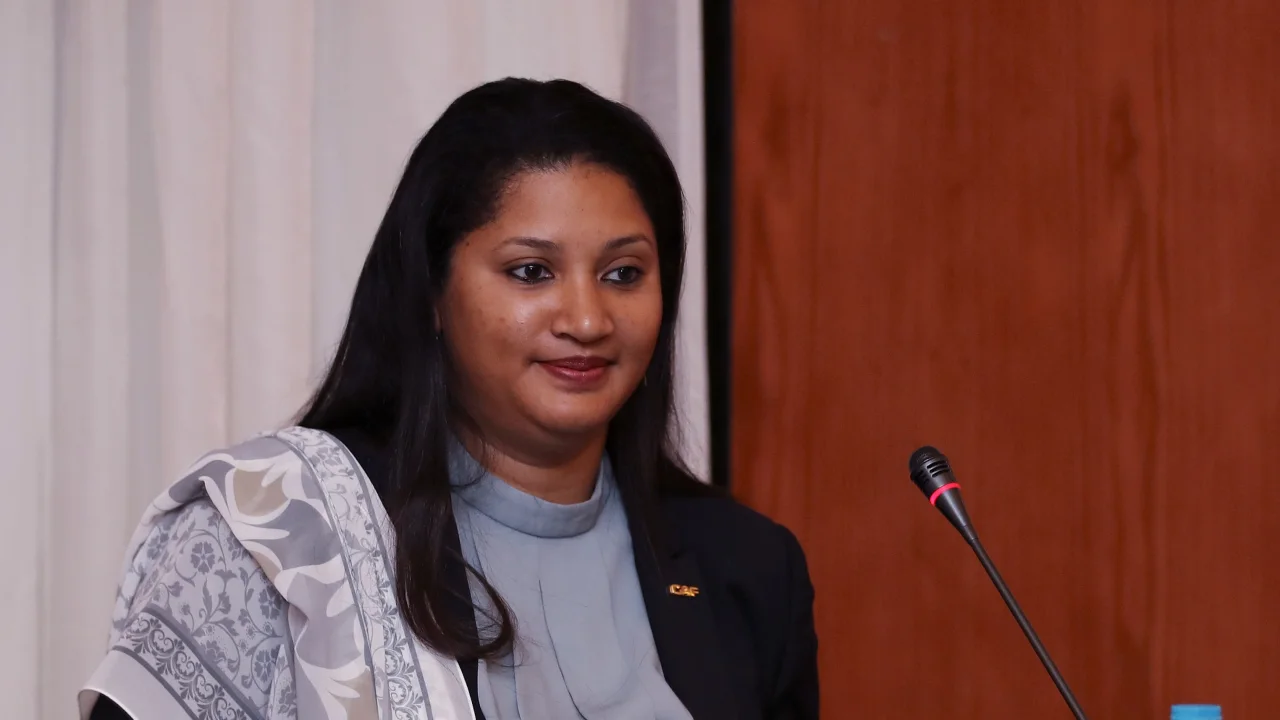In the early 1990s, women’s football in Africa was still in its infancy. The most popular sport on the continent was just beginning to interest young girls and some do not hesitate to defy social taboos to practice a discipline that is still very “masculine”. This audacity will bring a breath of fresh air that will forever change the history of African football.
From 1998, which marks the year of the first edition of the TotalEnergies Women’s Africa Cup of Nations, to date, things have changed.
On the eve of the kick-off of the 12th edition of this great event, the Chairperson of CAF Women’s Football Organizing Committee, Kanizat Ibrahim, will put CAF’s women’s football development strategy on full display. She presents the values of the most popular sport on the continent, its role in the advancement of African women and the means implemented by CAF to ensure that women’s football reaches the highest standards.
This is an interview done by CAFOnline.com.
The Women’s Africa Cup of Nations is now the subject of many discussions. But is this event really competitive on the world market?
Definitely, and without any doubt. This is the equivalent of AFCON. At the very beginning, AFCON was serving to only discover talents and players. Now we have world famous players who, for a competition like this, come back to highlight their country, their continent. These women are ambassadors. We can’t wait to see our own stars shining. Who is not eager to see what Asisat Oshoala of Nigeria does this year? Will the South African Thembi Kgatlana keep her title of best player acquired during the last edition? What will Ajara Njoya or Gabrielle Onguene do for Cameroon? Each of our teams now has renowned players.
With all these stars, is women’s football at the expected level in terms of play?
There is progress to be made in African football, not just for women. However, the efforts made in recent years have raised women’s football to a very good level, which is reassuring. Work is being done in the zones which now offer a plethora of women’s football events to their member associations. Watch COSAFA and its many events broadcast on television or CECAFA which has been playing tirelessly for years, UNAF and WAFU… This multiplication of competitive matches strengthens the players and the teams.
Check out our latest global outings, they’ve been decided on details. We felt that our players could compete in skill, talent, technique – and even win.
Cameroonian Ajara’s goal received acclaim around the world. It was one of the finest goals at the 2019 FIFA World Cup and that year it was nominated for the FIFA Puskas Awards. So yes, our teams have the level, we have what it takes. All that remains for us to consolidate is this mental and psychological maturity, which will allow us not to overestimate our opponents.

Let’s talk about this edition of Women’s AFCON which starts tomorrow. What are the innovations of this edition? How will it be different from the previous one?
For several reasons. Already for its format, we go from 8 to 12 teams. That means more stars, more games, more entertainment.
For the first time, CAF is going to see renowned commentators on site for the matches, it’s exceptional. In this team of TV commentators are legends of African football and TV stars.
In terms of refereeing… Initially, we had 226 women referees in the list for this competition, but for obvious reasons we had to choose a few. And it is after a rigorous process that we have selected our referees and assistant referees. They have been subjected to an intensive program and it continues until the day of kick-off. It is an opportunity for each of these women to stand out and show what they are capable of on the African scene and why not tomorrow worldwide. And the great announcement is that VAR will be used for the whole tournament.
Technically, each team will have its own training ground. It must be said that Morocco spared no effort to make the competition a success. It is a very good commitment from the Kingdom, which confirms our idea of this choice to host this competition.
Sponsorship is one of the biggest problems in women’s football. How do you intend to overcome this difficulty?
There is a real evolution in the way football is now presented. You can see that it is possible today to have a real career in women’s football, to dream big, to change your life and that of your family and to offer yourself a much brighter future than in the past. All this because today we are talking about the professionalisation of women’s football. Talking about professionalisation refers to optimal working conditions that offer prospects to female football players and to all those who work in this sector.
Some partners or sponsors have women’s football as a priority. And that’s where we won the first challenge. We are still far from the standards we want for this Africa Cup of Nations. But there is a big step forward.
As for the retransmission of matches, some of the usual large international groups have already acquired the rights. And even on the continent, countries that are not qualified for this final tournament will broadcast the matches. This is a nice step forward. The Women’s AFCON is a marketing product that is not limited to the African continent alone.
To conclude, what can we wish for this edition?
Above all, we wish success to all the participating teams.
We want this WAFCON to serve as a catalyst to attract as many sponsors as possible who will support African women’s football in the years to come, and make it professional.
And why not, to always remain very ambitious, to see an African team win the World Cup soon!
Source: CAF

